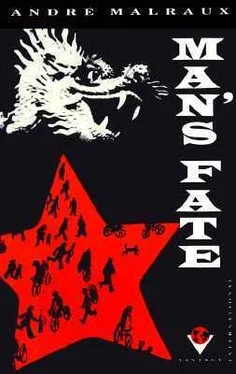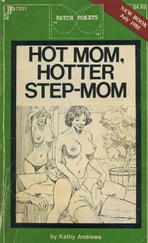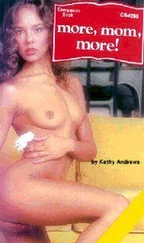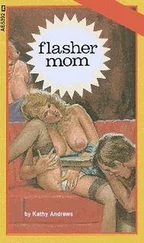Five minutes later he was having the cages arranged in the room. All the precious objects were put away in the closets, one of which was left open. He picked up a pair of pajamas that lay spread out on the bed, but the moment he touched the warm silk it seemed to him that this warmth became communicated through his arm to his whole body and that the material he was grasping had exactly covered one of her breasts: the dresses, the pajamas hanging in the half-open closet, held within them something more sensual, perhaps, than Valerie’s body itself. He had an impulse to bury his face in those pajamas, to press or tear, as though he were penetrating them, those garments still saturated with her presence. He would have taken the pajamas with him, if he had been able. He threw them into the closet, and the “boy” closed the door upon them. As the pajamas left his hand, the legend of Hercules and Omphale brusquely seized his imagination-Hercules dressed as a woman in soft, flimsy garments like these, humiliated and content in his humiliation. In vain he tried to summon the sadistic scenes that had insistently come before him awhile ago: the man worsted by Omphale and Dejanira weighed upon his whole mind, drowned it in a humiliating satisfaction. A sound of steps approached. He put his hand to his revolver in his pocket: if she had entered at that moment he would undoubtedly have killed her. The steps passed by the door and grew fainter. Ferral’s hand changed pockets and he nervously pulled out his handkerchief. He had to act, do something, escape from this state of mind: he had the parrots and cockatoos unchained, but the timid birds took refuge in the corners and in the curtains. The kangaroo had jumped on the bed and remained there. Ferral turned out the center light, left only the night-lamp: pink and white, with the magnificent curved flashes of their ornate wings, reminding of the phcenixes of the East India Company, the cockatoos began to stir about with a clumsy and restless flutter.
Those boxes full of excited little birds, scattered about on all the furniture, on the floor, in the fireplace, bothered him. He tried to discover why, could not imagine. Went out. Came in again, immediately understood: the room seemed devastated. Would he escape idiocy tonight? In spite of himself he had left here the blatant image of his anger.
“Open the cages,” he said to the “boy.”
“The room wil get dirty, Monsieur Ferral,” said the manager.
“Madame Serge will change her room. Don't worry, it won’t be tonight. You’ll send me the bill.”
“Flowers, Monsieur Ferral?”
“Nothing but the birds. And let no one come in here, not even the servants.”
The window was protected from mosquitoes by a screen. The birds would not fly away. The manager opened the casement to prevent the room from smelling foul.
And now, on the furniture and the curtains, in the corners of the ceiling, the island birds were wildly fluttering, their colors dull in this feeble light, like those of Chinese frescoes. Through hatred he would have offered Valerie his handsomest gift. He turned out the light, turned it on again, turned it out, then on. He was using the bed-side switch; he remembered the last night he had spent with Valerie in his apartment. He had an impulse to tear off the switch so that she would never be able to use it-with anyone. But he wanted to leave no trace of anger here.
“Take away the empty cages,” he said to the “boy.” “Have them burned.”
“If Madame Serge should ask who sent the birds,” said the manager, looking at Ferral with admiration, “is she to be told?”
“Won't ask. It's signed.”
He went out. He must have a woman tonight. However, he had no desire to go to the Chinese restaurant immediately. It was enough-for the time being-that he was sure there were bodies at his disposal. Often, when he was awakened with a start from a nightmare, he would feel the desire to continue his sleep in spite of the nightmare which would seize him again, and at the same time, the desire to escape it by becoming completely awake; sleep was the nightmare, but it was himself; awakening was peace, but the world. Tonight lust was the nightmare. He finally made up his mind to awaken from it, and had himself driven to the French Club: to talk, to enter into relation again with a human being, if only through conversation, was the surest awakening.
The bar was crowded: troubled times. Close to the half-open window, a beige cape of rough wool over his shoulders, alone and almost isolated, Gisors was seated with a sweet cocktail before him; Kyo had telephoned him that all was well and his father had come to the bar to pick up the rumors of the day, often absurd but at times significant: they were not so tonight. Ferral went up to him amid the greetings. He knew the nature of his lectures, but attached no importance to them; and he did not know that Kyo was in Shanghai at the present time. He considered it beneath his dignity to question Martial about persons, and Kyo’s role did not have a public character.
All those idiots who were iooldng at him with timid disapproval believed the bond between him and the oid man was opium. They were wrong. Ferral pretended to smoke-one, two pipes, always iess than would have been necessary for him to feei the effect of the opium-be- cause he found in the atmosphere of smoke-sessions, in the pipe that passed rrom mouth to mouth, a means of making advances to women. Having a horror of counship, of the exchange in which he paid by attributing importance to a woman for what she gave him in the way of pleasure, he eagerly seized everything that enabled him to dispense with it.
It was a more complex impulse which, not so long ago, in Peking, had occasionally made him come and stretch out on oid Gisors’ couch. The pleasure of scandalizing, to begin with. And then, he did not want to be mereiy the President of the Consortium, he wanted to be distinct from his activity-a way of considering himseif superior to it. His aimost aggressive iove of art, of thought, of the cynicism which he called iucidity, was a defense: Ferral had the backing neither of the “families" of the great credit estabiishments, nor of the Ministry of Finance. The Ferral dynasty was too closeiy linked to the history of the Republic to make it possibie to consider him as a mere upstart; but he remained an amateur, no matter how great his authority. Too ciever to attempt to fil the ditch that surrounded him, he widened it. Gisors’ great culture, his inteiiigence which was always at the service of anyone who sought him out, his disdain of conventions, his aimost aiways singuiar “points of view,” which Ferral did not hesitate to pass off as his o^wn when he had left ^m, brought them together more than all the rest separated them; with Ferral, Gisors talked politics only on the philosophical level. Ferral said he needed intelligence, and, when it was not the kind that offended him, this was true.
He looked around: at the very moment he sat do^, almost aU eyes turned away. Tonight he would gladly have married his cook, for no other reason than to force this crowd to accept her. It exasperated him to have all those idiots pass judgment on what he was doing; the less he saw them, the better: he suggested to Gisors that they go out for a drink on the terrace overlooking the garden. In spite of the coolness the “boys” had brought out a few tables.
“Do you think it is possible to know-really know- a human being?” he asked Gisors. They sat down near a small lamp. Its halo of light was absorbed by the darkness which was gradually filling with mist.
Gisors looked at him. “He would have no taste for psychology if he could impose his will.”
“Awoman?” he asked.
“What difference does it make?”
“There is something erotic about a mind which applies itself to elucidating a woman. To want to know a woman, it seems to me, is always a way of possessing her or of taking revenge on her. ”
Читать дальше











